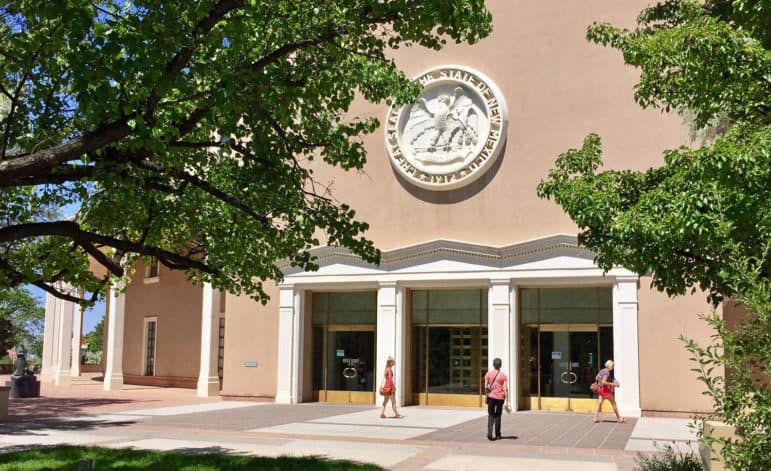
Heath Haussamen / NMPolitics.net
The Roundhouse in Santa Fe.
A state Senate committee rejected a proposal Friday to reinstate the tax on food except for a narrow range of healthy staples.
The bill also would have drastically limited purchases with federal food assistance to that same selection of groceries — meat, tortillas and anything covered by the federal Women, Infants and Children nutrition program.
The bill’s sponsor, Sen. Cliff Pirtle, argued the measure would provide an incentive for healthier eating in a state where obesity and diabetes are rampant.
But Democrats and a range of advocacy groups argued the measure would be an added burden on families’ grocery budgets. The Senate Corporations Committee voted 4-2 along party lines to table the bill.
Pirtle, R-Roswell, proposed last year to ban junk food purchases with benefits through the federal Supplemental Nutrition Assistance Program, or SNAP — often referred to as food stamps.
Democrats shot down the idea, arguing it was unfair to target a health initiative at low-income people.
Pirtle said the latest proposal was a compromise that would promote healthy eating regardless of whether shoppers used SNAP or not, while also ensuring the tax exemption on groceries would not apply to junk food.
“When we think of food, I don’t think many of us think of things that are prepared or processed or high calorie, high sugar,” Pirtle told the Senate Corporations Committee on Friday.
But longtime opponents of the food tax were quick to point out that the WIC program is designed specifically for women who are pregnant or breast-feeding and for very young children rather than for a broader range of dietary needs.
It also excludes plenty of healthy foods and is so specific, critics argued, that navigating the grocery store would become an ordeal for shoppers.
“There is a reason that no other state has ever attempted to tie its food tax exemption to the WIC program. Doing so is simply unworkable,” said Fred Nathan, executive director of Think New Mexico, a policy organization that has long opposed the food tax.
Others pointed out that New Mexico already has a high rate of poverty, making SNAP a lifeline.
And, as Chairman Clemente Sanchez, D-Grants, said: “I just have a problem with people telling people what to do — what to eat, what to drink.”
Roughly 460,000 New Mexicans are enrolled in the food benefit program.
A study published last year by the Harvard School of Public Health found food purchased with SNAP benefits tended to be less healthy than food that was not, suggesting the program was effectively subsidizing unhealthy diets.
And a 2015 study by researchers at Stanford University found a ban on using SNAP to purchase sugar-sweetened beverages could significantly reduce obesity and Type 2 diabetes, particularly among adults.
Dampening such proposals, however, the administration of President Donald Trump last month rejected an effort by the Maine government to prohibit buying junk food with SNAP benefits, citing concerns about additional administrative costs for retailers and the research that such a move would lead to “meaningful health outcomes.”
Contact Andrew Oxford at (505) 986-3093 or aoxford@sfnewmexican.com. Follow him on Twitter at @andrewboxford.
